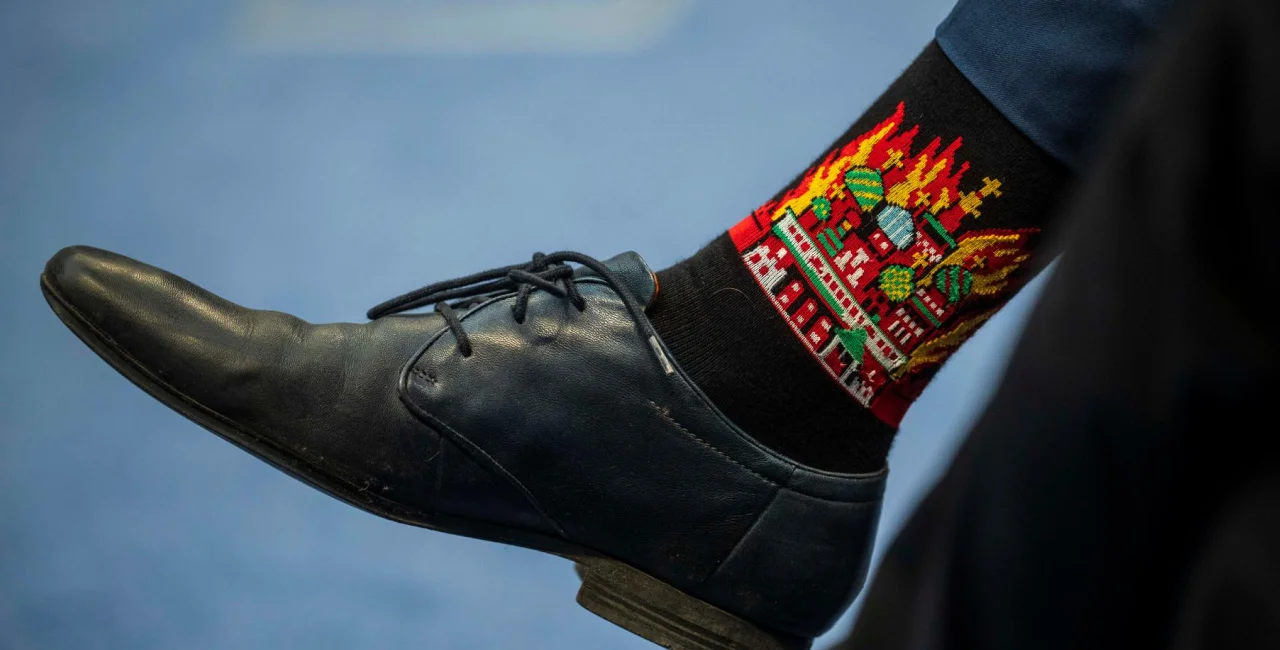On Thursday, Czechia marked Victory Day with rallies, reenactments, speeches, and ceremonies remembering the 80th anniversary of the end of World War II. As the country commemorated its liberation from Nazi rule, the Soviet Union’s role in that liberation—and its current actions in Ukraine—remains a contentious issue.
In his speech at Prague’s Wenceslas Square, Prime Minister Petr Fiala called on citizens to “stand on the side of freedom,” highlighting the ongoing struggle against tyranny in light of Russia’s invasion of Ukraine. Czech President Petr Pavel, speaking at Prague Castle, drew parallels between Russia and Nazi Germany.
“Today’s Russia is unfortunately behaving in some ways like Nazi Germany once did. It does not respect international law, it only respects the right of the stronger, it has invaded a sovereign country and has been waging a war of aggression against it for more than three years.”
Meanwhile, at a ceremony in Prague’s Olšany Cemetery, Czech politicians and Ukrainian Ambassador Vasyl Zvarych recalled the Ukrainians who fought alongside the Red Army during the liberation of Czechoslovakia in 1945.
But the tension between historical memory and current-day geopolitics reached fever pitch this week as Russian leaders challenged how the Soviet legacy is being remembered in Czechia and across Europe.
Socks and statues ignite controversy
One of the catalysts was a pair of controversial socks, depicting the Kremlin in flames, worn by Czech government envoy Tomáš Kopečný during a meeting with Ukrainian President Zelenskyy at Prague Castle. The gesture sparked outrage in Russia, with Andrey Klimov, Deputy Chairman of the Russian Federation Council, accusing Kopečný of “degeneracy.”
Vládnà zmocnÄ›nec pro rekonstrukci Ukrajiny Tomáš KopeÄný, který si v Praze na setkánà s ukrajinským prezidentem oblékl ponožky s hoÅ™ÃcÃm Kremlem, je bastard a mÄ›l by navÅ¡tÃvit psychiatra, prohlásil mÃstopÅ™edseda výboru Rady federace pro mezinárodnà záležitosti Andrej Klimov.… pic.twitter.com/F33XrMynPm
— Poslednà skautâ„¢ (@Posledniskaut) May 7, 2025
Kopečný fired back, saying, “For four years, the Russians have been bombarding Ukrainian cities with missiles and killing innocent people... But a pair of symbolic Ukrainian socks showing what it might look like if the same happened to their cities made them furious.”
Russia’s fury also resurfaced over the removal of the Soviet Marshal Ivan Konev statue from Prague in 2020. Russian Foreign Ministry spokeswoman Maria Zakharova called Czech Foreign Minister Jan Lipavský’s statement that Russia had no claim to the statue “servility to meanness.”
Lipavský responded, saying that the statue, placed in 1980, was a symbol of servility toward Moscow, and that its removal highlighted Konev’s darker role in the occupation of Czechoslovakia in 1968.

“The Czech Bolsheviks placed this decoration on the square in Prague 6 in 1980 as an expression of servility towards Moscow. And the Czech Democrats decided to remove it to point out the dark role of Ivan Konev in the history of the enslavement of European nations,” Lipavský said Wednesday on the X network.
The monument is currently on loan from Prague 6 to the Museum of Memory of the 20th Century, and for now, it is stored in the depository of works of art in Měšice.
In Teplice, the destruction of a Soviet war memorial further ignited tensions, with Russian officials calling for criminal proceedings. The statue, which had stood since 1955, was torn down by unknown perpetrators. The town leadership condemned the act.
A new 'Iron Curtain'?
On May 8, Moscow hosted its own Victory Day celebrations. While most Western politicians refrained from attending due to Russia’s invasion of Ukraine, Slovak Prime Minister Robert Fico forged ahead but was forced to take a circuitous route to Russia.
In his pre-departure speech, Fico, expressing frustration that Bratislava had been denied permission to fly over Baltic airspace (the PM traveled via Hungary, Romania, and the Black Sea instead) likened the current tensions between East and West to a “new Iron Curtain.”
However, opposition leaders in Slovakia criticized his actions as a “mockery of the memory of all those who gave their lives in World War II for our freedom,” with former Prime Minister Igor Matovic denouncing Fico’s visit as morally indefensible in light of Russia’s actions in Ukraine.
'We don't know how and whom to celebrate'
Political commentator Lukáš Jelínek, writing for iRozhlas.cz called the May 8 celebrations a historical paradox for Czechia.
“It’s clear that we don’t know how and whom to celebrate, how to commemorate the liberators so that it doesn’t look like support for contemporary Russia and Vladimir Putin,” he wrote.
Jelínek acknowledged the contributions of Soviet and Ukrainian soldiers while arguing that, while historical complexities shouldn’t erase gratitude for liberation, current geopolitical tensions make it difficult to reconcile these past actions with Russia’s ongoing invasion of Ukraine.













 Reading time: 3 minutes
Reading time: 3 minutes 





























